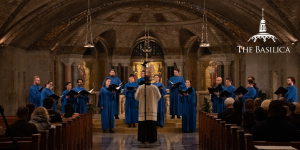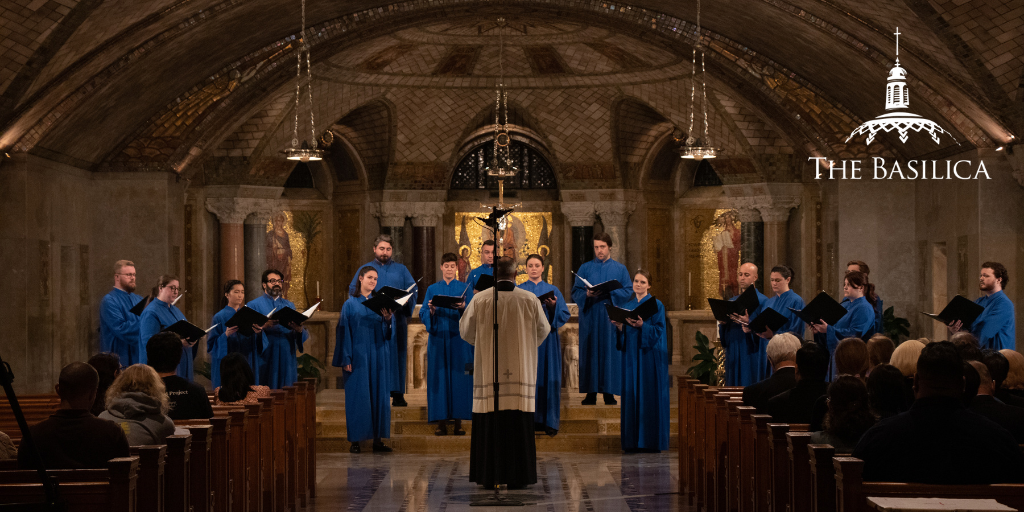
From the desk of Dr. Peter Latona, Director of Music
During the final hours before His death, Christ was battered and bruised. To outward appearances, it seemed He had been beaten by everyone and everything. Yet even as He felt the weight of suffering and sin upon His shoulders, He assured the contrite thief beside Him of the hope he had in death: “Truly, I say to you, today you will be with me in paradise.” (Luke 23:43).
That same hope is offered to the faithful today. Through Christ Jesus’ death and resurrection, the promise of eternal life is made possible – and those who hope in the Lord will indeed rise.
This truth is the guiding theme of the Choir of the Basilica’s 2023 All Souls’ Day concert, entitled “They Will Rise.” The name comes from a dramatic, uplifting, and brilliant work by Jonathan Dove, which is the second piece in our concert program. Commissioned by the Dean and Chapter of Westminster Abbey, “They Will Rise” commemorates the 2018 centenary of the British Royal Air Force. Its text is from Isaiah 40:31, speaking of God’s promise of strength for the weary to not only meet daily challenges, but to rise above and soar as on the wings of eagles.
Today, I invite you to explore the themes of our All Souls’ concert program, remembering that God provides us the strength and the guidance to rise above the mundane and soar toward eternal life.
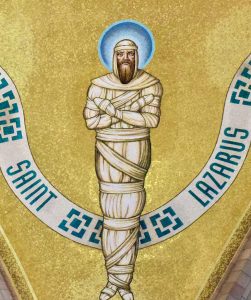
“Fremuit spiritu Jesus” – Jacobus Clemens non Papa
This motet by Jacob Clemens non Papa is remarkable in that five parts are composed in imitative counterpoint telling the story of Lazarus from John 11, where Jesus’ power over death and promise of eternal life are revealed to His disciples. Though Mary and Martha had asked Jesus to come heal their brother Lazarus while he was still alive, it was not until four days after his death that Jesus arrived. In a profound demonstration of His power, Christ raised Lazarus to life, summoning him to come out of his tomb with the words “Veni foras!”
In “Fremuit spiritu Jesus,” the phrase features prominently, repeated by the second soprano 12 times in a crescendo until the conclusion, when the full chorus sings: “Lazarus, veni foras!” – translated as: “Lazarus, come out!”
“In paradisum” from Requiem by Gabriel Fauré
The sense of hope ascending is continued in the “In paradisum” from Fauré’s beloved Requiem, where a transparent texture and soaring melodic lines seem to move us upward to heaven. While this piece also mentions a Lazarus, this man is the “other” Lazarus of the New Testament, a beggar. His character in the parable from Luke 16 teaches us that we must leave aside our attachment of earthly things to win the riches of eternal life with Christ.
“One thing have I desired” by Herbert Sumsion and “And I Saw a New Heaven” by Edgar Bainton
From the psalms in the Old Testament to the Book of Revelations, where the promise of eternal life is revealed in a vision, the promise of eternal life is ever present in the Scriptures. The next two pieces in the program reflect our anticipation of that eternal glory as related in the Word. In “One thing have I desired,” our desire to “dwell in the house of the Lord” as expressed by King David in Psalm 27 is set in a most simple yet poignant manner in the space of merely 25 measures. “And I Saw a New Heaven” is a musical expression of the uniting of the earthly domain and the heavenly domain, where death will be replaced by life, all things will be made new, and God shall wipe away every tear.
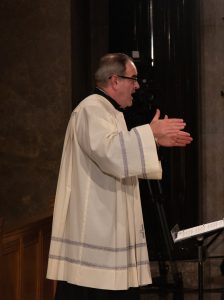
“Da pacem” by Arvo Pärt
With all the suffering in our world – from poverty, war, violence and hatred – there is an unremitting need for God’s presence, His spirit, His peace. “Da pacem” is offered as a prayer for peace in the Middle East, in Ukraine, in our nation, in our families, and wherever people are torn apart by hatred and violence.
The Saints Triumphant: A Triptych for Armistice Day by Peter Latona
The Saints Triumphant: A Triptych for Armistice Day was commissioned by The Knights of Columbus for the centenary of the end of World War I and premiered at a ceremony on November 11, 2018. The text of the first and middle movements are by poet Joyce Kilmer – “The Prayer of a Soldier in France” and “The Rouge Bouquet” – and the final is a setting of the familiar text by William How from the hymn “For All the Saints.”
“The Prayer of a Soldier in France” juxtaposes the suffering of the soldier with that of Christ, pointing us towards Christ for strength as we each bear our own crosses. Ultimately, it reminds us that those who die in Christ will rise with Him and be counted among the saints. The middle movement, “The Rouge Bouquet,” is named for a wooded area near Parroy, France, where a deadly battle occurred. Through this section, the place becomes a “worthy grave of pain and pride” and the gateway to the place beside the saints in heaven. The final movement is a hymn of victory won, paradise, and the crown of gold for those for whom the Lord was their Rock, their Fortress, their Captain and their Might.
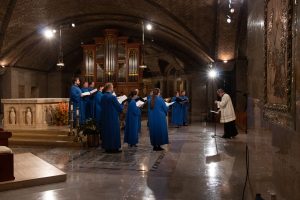
“O How Amiable” by Ralph Vaughan Williams
Our concert program concludes with “O How Amiable” by Ralph Vaughan Williams and a fervent declaration, sung in unison by full choir, that God is our help in ages past, our hope for a brighter future and the conviction that our eternal home is with God.
Experience the program live by joining us in person or virtually on All Souls’ Day, November 2, 2023, in the Crypt Church of the Basilica at 7:00 p.m. ET, livestreamed from nationalshrine.org/mass.

